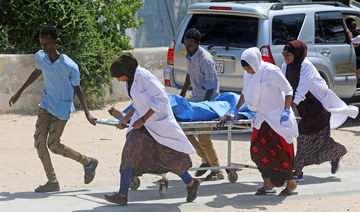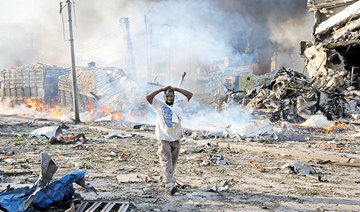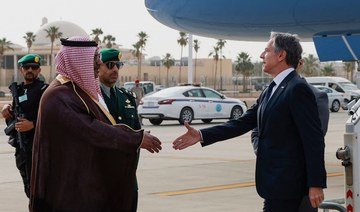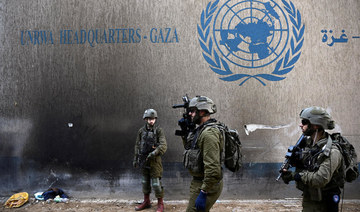NAIROBI: Deployed in one of the world’s most dangerous conflicts, Somali soldiers risking their lives daily against Al-Shabab insurgents were growing weary of being paid months late and shortchanged by their superiors.
“We never received the complete amount,” a captain told AFP on condition of anonymity, grumbling about “middlemen” who syphon off troops’ meagre wages — some as low as $100 a month — and plunder budgets meant for weapons, rations and uniforms.
Then in March, his pay arrived on time, in full and straight to his bank account, in what officials say is the first step in a radical shake-up of its graft-ridden armed forces.
The government, under pressure from foreign backers, has started paying troops directly, bypassing army commanders previously tasked with disbursing their pay but diverting the money instead.
Under the new system, payments are linked to a biometric database containing soldiers’ fingerprints, personal details and bank accounts, replacing patchy records kept on Excel spreadsheets.
Officials say about 10,000 “ghost soldiers” were expunged from the records — roughly one in three troops according to government estimates, though analysts questioned these figures.
These fictitious troops either did not exist at all or had long ago deserted.
By taking control of salary payments, Mogadishu is seeking to cut out powerful commanders who for decades ran the Somali National Army (SNA) “as private fiefdoms,” Fiona Blyth from the UN Assistance Mission in Somalia wrote in an April report.
The shake-up was fiercely resisted in some quarters of the army, with several soldiers deserting their barracks in March in protest.
But the government is pressing ahead. In July it also began registering fighters from an allied militia into its security forces, and identifying older or injured soldiers for retirement.
Mogadishu says the reforms are a milestone in decade-long efforts to rebuild the army into a force capable of taking over when the roughly 20,000 African Union AMISOM peacekeepers leave.
“We are not there yet. A lot of things need to be done first... but ultimately I think it will be a game changer,” a government adviser told AFP.
African soldiers were deployed in 2007 to provide muscle until Somalia’s army could stand on its own. AMISOM’s withdrawal is slated for 2021.
Somalia’s donors have long complained that there is little to show for the hundreds of millions poured into rebuilding the SNA.
In 2017, after a decade of international money and support, an internal review concluded the army was a “fragile force with extremely weak command and control and military capabilities.”
Many units lacked weapons, basic medical supplies and even uniforms.
That same year, the United States suspended aid for the SNA over fraud concerns.
But recent efforts to boost accountability and professionalism in the military have struck a chord with traditional allies.
The United States announced this month it was resuming limited, non-lethal assistance to an army unit in Lower Shabelle, where SNA and AMISOM troops liberated key towns from Al-Shabab in April and May.
“The US notes several Somali-led steps toward security sector reform over the last year, notably the biometric registration,” a State Department official told AFP.
Mohamed Ali Hagaa, a cabinet minister and top defense official, told AFP this “clearly demonstrates increased confidence in the security sector.”
Analysts say the reforms, though important, gloss over a sobering reality: the SNA is nowhere near ready to secure a nation mired in civil war, clan violence and jihadists still controlling swathes of countryside.
“It’s really an army in name only,” said Matt Bryden, director of Nairobi-based think tank Sahan.
“Just because an individual has been biometrically registered and is on some payroll list, doesn’t mean that they are actually a trained soldier in a formed unit.”
The SNA faces a formidable foe in Al-Shabab, which this month alone bombed the Mogadishu mayor’s office, blew up a checkpoint near Somalia’s international airport and stormed a hotel with gunmen, collectively killing 49 people.
In January, heavily-armed jihadists overran a military camp on the outskirts of Kismayo, killing at least eight soldiers in one of their frequent ambushes of SNA locations.
Efforts by Somalia’s international partners to ready the SNA for war have been criticized as being uncoordinated and piecemeal.
Some are trained by the British, others by the EU or the Turkish. Until 2018, the United Arab Emirates drilled its own troops in Somalia while the US, which focuses on drone strikes and Somalia’s special forces, mentors another unit.
Encouraging these myriad stakeholders — all with their own strategic ambitions in the Horn of Africa nation — to work together has been difficult, say analysts.
Until this happens, the SNA would be “highly uneven in their effectiveness,” said Paul D. Williams, associate professor at the Elliott School of International Affairs at George Washington University.
“Ideally, greater coherence would come from fewer partners directly training and mentoring the SNA. But no single country has proved willing to offer the entire package,” he said.
Under siege, Somalia moves to reform its army, pay troops
Under siege, Somalia moves to reform its army, pay troops

- The government, under pressure from foreign backers, has started paying troops directly
- Officials say about 10,000 “ghost soldiers” were expunged from the records
Only two states for Israel and Palestine can prevent all-out regional conflict: Egypt PM
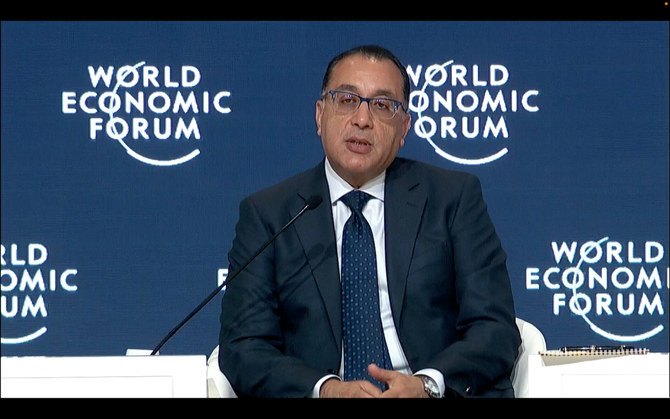
- Israel risking its future, says Egypt official at World Economic Forum
- Jordan’s PM also accuses Tel Aviv of not wanting ‘a political solution’
RIYADH: Only a two-state solution for Israel and Palestine can prevent the outbreak of an all-out regional and possible global conflict, said Egypt’s Prime Minister Mostafa Madbouli at the World Economic Forum here on Monday.
Participating in a panel discussion on Gaza, Madbouli said that if the current situation continues this would also affect the future of Israel.
“It is now or never, the whole world should unite to recognize the rights of Palestinians to have their own state. If you could imagine that postponing this will solve the problem, or will be in Israel’s interest, you are wrong. It will be against the future of Israel itself.”
He added: “We are speaking about a nation that has been under aggression and occupation for the past 75 years. Behind closed doors, everybody recognizes their right to exist, but when it comes to reality, and to have a solid solution, everybody is refraining.”
Madbouli said a two-state solution is the only remedy to achieve regional peace.
“It is today that we all have to push for a two-state solution, along with a serious regional solution. No one can imagine the situation if a regional war had to start. If you imagine that you are far then you are in a very elusive situation, everybody will be affected. We have already seen a sample of a war between Iran and Israel this month.”
Other panelists, including Jordan’s Prime Minister Bisher Al-Khasawneh and Sigrid Kaag, the UN humanitarian and reconstruction coordinator for Gaza, expressed their frustration with the situation on the ground.
Al-Khasawneh said: “This is indeed an extremely timely event, challenging and depressing. There are a lot of diplomatic activities underway, along with the continued Israeli aggression on Gaza and the potential for another catastrophic additional aggression on Rafah, which by all standards will be a catastrophe that adds on to a catastrophe that has led to conditions close to famine in Gaza.”
He said the damage caused by Israel’s campaign is estimated to be about $18.7 billion; and that the UN reports that 1.1 million children require psychological counseling.
Al-Khasawneh also called for a two-state solution: “Israel insists on making the same mistakes, and expecting different results, which is not engaging seriously in a political solution.”
He added: “The world seems to be falling into the trap of following the agenda of narrow-minded Israeli politicians, frankly speaking, and it is quite catastrophic. Today it is about the political calculations of some politicians in Israel at the expense of, the safety of Israelis, the safety of Jordanians, Egyptians, and all the Arabs. Today it’s the safety of the whole region and beyond.”
Kaag said a political solution has to be found. “If we look ahead, the reconstruction efforts, from an investment perspective, are all tied to the political parameters, the two-state solution.”
Kaag added: “The paradigm shift is in the now, but it’s also looking towards the future because of the level of destruction and despair, people there tell you that they feel like zombies. The mental health crisis is humongous. So, we need to create hope through investment, rehabilitation, and focus on the political effort. I think we failed the Palestinians countless times, and they deserve more human rights.”
Blinken ‘hopeful’ of Gaza ceasefire deal
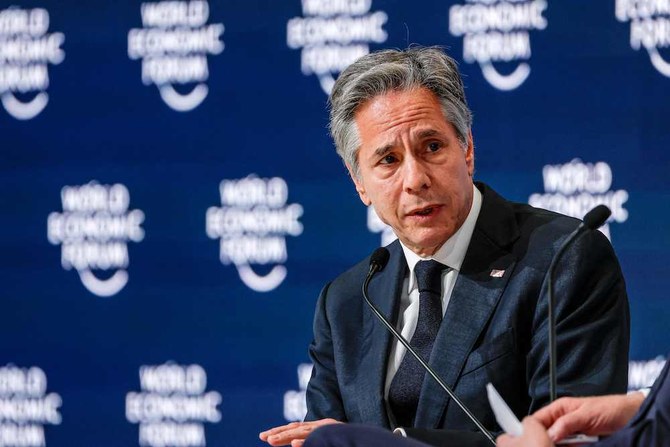
- Secretary of state confirms US opposition to Rafah incursion at WEF meeting in Riyadh
- Statement comes day after Palestinian President Abbas warns US ‘only country’ capable of averting catastrophe in Rafah
RIYADH: US Secretary of State Antony Blinken said he is hopeful Hamas will accept an “extraordinarily generous” ceasefire offer to stop Israel’s devastating Gaza offensive in return for the release of hostages.
“Hamas must decide, and decide quickly, whether to accept the extraordinarily generous offer for a ceasefire. I am hopeful they would make the right decision, and we can make a fundamental change in the dynamics,” the US official told a World Economic Forum panel in Riyadh.
A high-level Egyptian delegation flew in to Israel for talks last Friday amid a new diplomatic push for a truce in the six-month hostilities and the release of Israeli hostages held by the Palestinian militants.
The conflict in Gaza, which began following the Hamas-led assault on southern Israel on Oct. 7 last year, has resulted in the deaths of almost 35,000 Palestinians, mostly women and children, and reduced 75 percent of the besieged enclave into rubble according to authorities there.
“We are working with partners trying to bring the conflict to an end, trying to ensure it does not spread and all of it is a collective effort. The quickest way to bring the Gaza conflict to an end is to get to a ceasefire and the release of hostages,” Blinken said, as he thanked Egypt and Qatar for their instrumental role in pushing for a truce and the release of hostages.
Blinken also reiterated US opposition to an impending Israeli military operation in Gaza’s southernmost city of Rafah in the absence of a plan to ensure civilians will not be harmed.
“We have not yet seen a plan that gives us confidence that civilians can be effectively protected,” Blinken said.
Israel has for weeks threatened to launch an all-out offensive in Gaza to destroy Hamas’s remaining forces.
Palestinian President Mahmoud Abbas, who spoke during a WEF panel a day earlier, said the US “was the only country capable” of preventing Israel’s long-feared invasion of Rafah, where more than 1.5 million Palestinians are currently living.
Only a “small strike” on Rafah would force the Palestinian population to flee the Gaza Strip, and the “biggest catastrophe in the Palestinian people’s history would then happen,” Abbas said.
Blinken said there was a “need to be ready for a day-after plan for Gaza to include what is to be done about security, governance and administration and humanitarian and reconstruction needs.
“A lot of work has been done on that, more work needs to be done,” he said.
Blinken also said that the “single biggest rebuke to both Iran and Hamas would be Israel having normal relations with every country in the region and the realization of the Palestinian state.
“The US and Saudi Arabia have done intense work together over the past months to focus on the Saudi-Israeli normalization agreement. I think it is is potentially close to completion,” he said.
“But for the normalization to move forward … two things would be required: calm in Gaza and a credible pathway to a Palestinian state.”
Blinken earlier joined the opening of a US-Gulf Cooperation Council meeting, where he told the region’s foreign ministers that the best way to ease the humanitarian catastrophe in Gaza would be to negotiate a ceasefire agreement that would release hostages held by Hamas.
The top US diplomat met separately with Saudi Prince Faisal bin Farhan, minister of foreign affairs, where they reviewed ways to strengthen bilateral relations and joint cooperation in various fields, the Saudi Press Agency said.
Egypt ‘hopeful’ of new Israel-Hamas truce: foreign minister
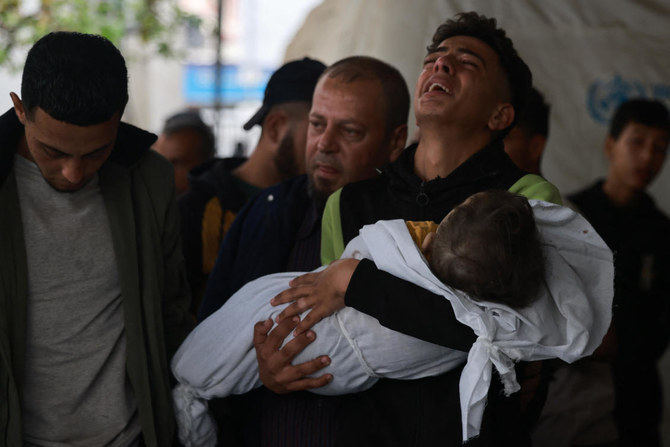
- A Hamas delegation was due in Egypt on Monday, where it is expected to respond to Israel’s latest proposal for a truce in Gaza
Riyadh: Egypt’s foreign minister said he was “hopeful” about a new proposal for a truce in Gaza as a Hamas delegation was due in Cairo for talks on Monday.
“There is a proposal on the table (and it’s) up to the two sides to consider and accept,” Sameh Shoukry said in Riyadh at the World Economic Forum.
“We are hopeful,” he added, explaining that “the proposal has taken into account the positions of both sides and has tried to extract moderation.”
“We are waiting to have a final decision. There are factors that will have an impact on both side’s decisions, but I hope that all will rise to the occasion.”
Egypt, Qatar and the United States have been trying to mediate an agreement between Israel and Hamas for months, but a flurry of diplomacy in recent days appeared to suggest a new push toward halting the fighting.
A Hamas delegation was due in Egypt on Monday, where it is expected to respond to Israel’s latest proposal for a truce in Gaza and a release of hostages after almost seven months of war.
A senior Hamas official said on Sunday that the Palestinian group had no “major issues” with the most recent truce plan.
“The atmosphere is positive unless there are new Israeli obstacles,” the official told AFP, requesting anonymity to discuss the negotiations.
Israel concerned over possible ICC arrest warrants related to Gaza war
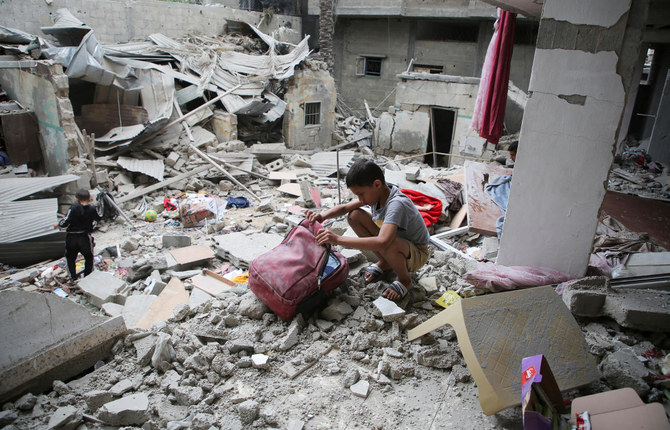
- Prime Minister Benjamin Netanyahu said on Friday that any ICC decisions would not affect Israel’s actions but would set a dangerous precedent
- Israeli officials are worried the court could issue arrest warrants against Netanyahu and other top officials for alleged violations in Gaza
JERUSALEM: Israel is voicing concern that the International Criminal Court could be preparing to issue arrest warrants for government officials on charges related to its war against Hamas.
The ICC — which can charge individuals with war crimes, crimes against humanity and genocide — is investigating Hamas’ Oct. 7 cross-border attack and Israel’s devastating military assault on Hamas-ruled Gaza, now in its seventh month.
In response to Israeli media reports that the ICC might soon issue arrest warrants for senior Israeli government and military officials, Foreign Minister Israel Katz on Sunday warned Israeli embassies to bolster their security because of the risk of a “wave of severe antisemitism.”
“We expect the court (ICC) to refrain from issuing arrest warrants against senior Israeli political and security officials,” Katz said. “We will not bow our heads or be deterred and will continue to fight.”
Prime Minister Benjamin Netanyahu said on Friday that any ICC decisions would not affect Israel’s actions but would set a dangerous precedent.
Israeli officials are worried that the court could issue arrest warrants against Netanyahu and other top officials for alleged violations of international humanitarian law in Gaza, Israeli media have reported.
They said the ICC is also considering arrest warrants for leaders from Hamas.
The ICC, based in The Hague, and Hamas, Gaza’s ruling group, did not immediately respond to requests for comment.
Israel is not a member of the court and does not recognize its jurisdiction, but the Palestinian territories were admitted with the status of a member state in 2015.
In October, ICC Chief Prosecutor Karim Khan said the court had jurisdiction over any potential war crimes committed by Hamas fighters in Israel and by Israeli forces in the Gaza Strip.
Khan has said his team is actively investigating any crimes allegedly committed in Gaza and that those who are in breach of the law will be held accountable.
On Oct. 7, Hamas led an attack on Israeli military bases and communities in which 1,200 people were killed, mostly civilians, and 253 were taken as hostages, according to Israeli tallies.
Israel has since launched a ground, air and sea offensive that has killed more than 34,000 Palestinians, according to Gaza authorities, and has laid much of the small, densely populated coastal territory to waste.
The Gaza Health Ministry does not distinguish between combatants and non-combatants in its casualty reports but most of the fatalities have been civilians, health officials say.
Israel says that it takes precautions to minimize civilian deaths and that at least a third of the Gaza fatalities are combatants, figures that Hamas has dismissed.
Israel’s military campaign has displaced most of the blockaded Palestinian enclave’s 2.3 million people and created a humanitarian crisis.
The case at the ICC is separate from a genocide case launched against Israel at the International Court of Justice, also based in The Hague.
The ICJ, also known as the World Court, is a United Nations court that deals with disputes between states, while the ICC is a treaty-based criminal court focusing on individual criminal responsibility for war crimes.
Likely attack by Yemen’s Houthis targets a vessel in the Red Sea
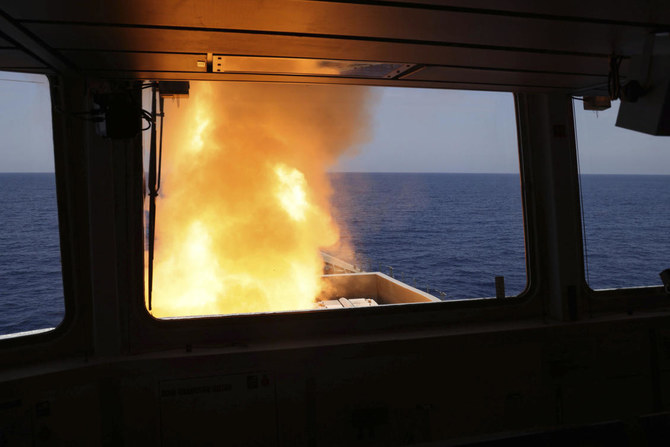
- The attack happened off the coast of Mokha, Yemen
- The Houthis did not immediately acknowledge any attacks
JERUSALEM: A suspected attack by Yemen’s Houthis targeted a vessel in the Red Sea on Monday, authorities said, the latest assault in their campaign against international shipping in the crucial maritime route.
The attack happened off the coast of Mokha, Yemen, the British military’s United Kingdom Maritime Trade Operations center said, without offering any other immediate details.
It urged vessels to exercise caution in the area.
The Houthis did not immediately acknowledge any attack there, though suspicion fell on the group. It typically takes the militia several hours before claiming their assaults.
The Houthis say their attacks on shipping in the Red Sea and Gulf of Aden are aimed at pressuring Israel to end its war against Hamas in Gaza, which has killed more than 34,000 Palestinians there. The war began after Hamas-led militants attacked Israel on Oct. 7, killing 1,200 people and taking some 250 others hostage.
The Houthis have launched more than 50 attacks on shipping, seized one vessel and sank another since November, according to the US Maritime Administration.
Houthi attacks have dropped in recent weeks as the militia has been targeted by a US-led airstrike campaign in Yemen. Shipping through the Red Sea and Gulf of Aden has declined because of the threat.
American officials have speculated that the militia may be running out of weapons as a result of the US-led campaign against them and after firing drones and missiles steadily in the last months. However, the Houthis have renewed their attacks in the last week.
The Houthis on Saturday claimed it shot down another of the US military’s MQ-9 Reaper drones, airing footage of parts that corresponded to known pieces of the unmanned aircraft. US Air Force Lt. Col. Bryon J. McGarry, a Defense Department spokesperson, acknowledged to The Associated Press on Saturday that “a US Air Force MQ-9 drone crashed in Yemen.” He said an investigation was underway, without elaborating.



